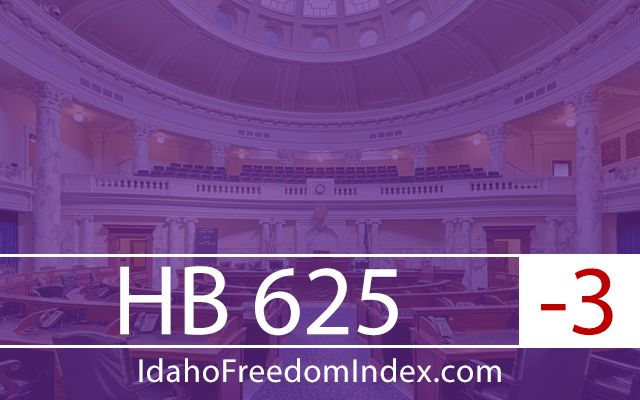


Bill description: HB 625 would implement a new tax on all opioid sales in the state, and would establish new education and intervention programs to combat opioid addiction.
Rating: - 3
Does it create, expand, or enlarge any agency, board, program, function, or activity of government? Conversely, does it eliminate or curtail the size or scope of government?
HB 625 would expand the roles of the public health districts and Division of Behavioral Health within the Department of Health and Welfare, as well as the state Board of Pharmacy. The state Board of Pharmacy would be responsible for providing educational outreach to medical providers and the public, the Division of Behavioral Health would expand its role in providing medication-assisted treatment programs, and the public health districts would be responsible for providing new funding to local recovery centers. The Department of Health and Welfare would also be able to operate or engage in any other programs “related to treating or preventing opioid addiction in Idaho.”
(-1)
Does it directly or indirectly create or increase any taxes, fees, or other assessments? Conversely, does it eliminate or reduce any taxes, fees, or other assessments?
On morphine distributed into the state, HB 625 would assess a one-half cent tax per morphine milligram equivalent.
For an individual taking a 15 milligram oxycodone tablet four times per day, this would amount to a roughly $0.45 tax per day (however, based on the average daily dosage prescribed in the U.S., the tax would be $0.24 daily).
In total, the Fiscal Note for HB 625 estimates that the cost to those who distribute opioids into the state, and by extension consumers who use them, would be $4.98 million per year.
(-1)
Does it increase government spending (for objectionable purposes) or debt? Conversely, does it decrease government spending or debt?
Monies raised from HB 625's new tax would be distributed as follows: $200,000 would go toward Board of Pharmacy programs; public health districts would get up to $1.9 million; and the Division of Behavioral Health would receive up to $1.9 million. Any remaining monies raised from the new tax would be spent through other programs related to opioid education and intervention at the state Department of Health and Welfare.
(-1)


